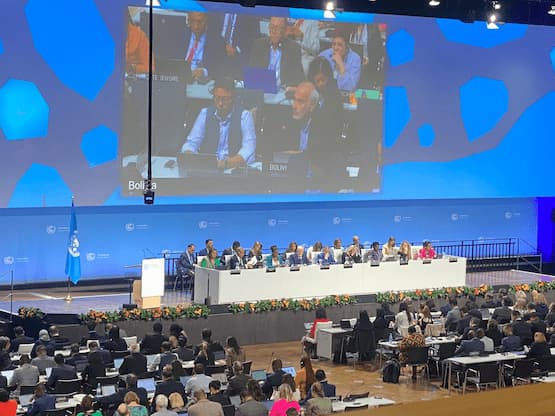Monash University Engages with Global Leaders at 2024 Bonn Climate Conference
Monash was honoured to join delegates from 198 countries at the Bonn Climate Conference in Germany in preparation for COP29. The Bonn Conference is a vital mid-way check point to the next UN Climate Change Conference to be held in Baku, Azerbaijan, this November and will help pave the way for the major decisions to be made there. This year around 6,000 people from national delegations, NGOs and civil society groups met in Bonn from 3 to 13 June.
What is the Bonn Climate Change Conference?
The international climate community gathers in Bonn, Germany in June each year to discuss and negotiate the urgent social, economic and environmental issues related to climate change and lay the foundation for important climate goals and decisions which are taken at the annual COP later in the year. The UNFCCC hosts these inter-sessional meetings at its headquarters in Bonn, Germany to ensure that the necessary groundwork is laid so that each COP can continue to effectively address the most pressing climate issues globally.
Key themes for the 2024 meeting
Key themes discussed at Bonn this year included climate finance, national plans for phasing out fossil fuels and climate adaptation however it is noted that little progress was made on these topics due to challenges in coming to an agreement between developed and developing nations.
Even though COP28 did not end in an agreed end to the use of fossil fuels, there was a passionate plea from all countries to transition away from fossil fuels. Following COP28 in Dubai last year, most countries are working on improving their Nationally Determined Contributions (NDC) by early 2025 so the discussions at Bonn come at an important time encouraging countries to explore climate change mitigation plans and plans on adaptation and loss and damage.
After two weeks of negotiations parties have agreed to postpone further consideration of emission avoidance and conservation enhancement to 2028 and maintain the status quo until then.
A focal discussion which happened behind closed-door negotiations was the “New Collective Quantified Goal” (NCQG) on climate finance which is set to be a focal point at COP29 to guide the provision of climate finance. Due to the complex nature of these discussions there has been slow progress, where developed and developing countries have disagreed on almost every aspect of the new target, including the amount of money that should be provided, who should provide it, who should receive it and what kind of funds should be included. Another topical issue is transparency reporting, where countries will be required to report and review climate data, information and action.
The UNFCCC Secretariat has mobilised partners across the UN system and beyond to support parties in preparing their first biennial transparency reports (BTRs) under the Paris Agreement’s reporting framework with Andorra and Guyana leading the way.
An area which made significant progress at COP28 was “Global Goal on Adaptation” (GGA). where negotiators agreed on a framework to guide countries in their efforts to prepare for rising global temperatures, this is also now referred to as the ‘UAE Framework for Global Climate Resilience’. Demands for developed countries to provide climate finance continued to be a live issue throughout the negotiations in Bonn.
Food and agriculture is often overlooked in climate discussions however a major win at this year’s Bonn conference was the agreement on a roadmap to discuss climate action for agriculture and food security which will allow countries to take further in Baku, to help create a global climate-smart sustainable food system.
Monash participation at Bonn
Associate Professor Susie Ho and Matthew French represented Monash at this year’s Bonn Climate Change Conference. Monash has been participating at UN Climate Change Conferences since becoming an official Observer Organisation of the United Nations Framework Convention on Climate Change in 2016.
This year we were honoured to lead a number of key events. A passionate advocate of youth empowerment in climate action, Dr Susie Ho led and contributed to a number of sessions around the disproportionate impacts of climate change on children and youth. Monash delegates also had an opportunity to engage with notable government delegates, negotiators, policy-makers, Indigenous leaders, fellow academics, climate action advocates, and young change agents from hundreds of countries.
Monash is committed to tackling climate change in Australia, the region and beyond

Action on climate change is a key priority and core focus for Monash inline with our Impact 2023 strategy and the UN Climate Change Conferences are an integral part of our climate action agenda and journey. Monash takes pride in our leadership in climate action through game changing global research programs such as NetZero, Pacific Action for Climate Transitions (PACT), Revitalising Informal Settlements and their Environments (RISE) and Citarum Action Research Program (CARP).
A Monash delegation will be joining COP29 in Baku, Azerbaijan
Last year, we were proud to be the first Asia Pacific university to be selected to host a pavilion in the high profile UNFCCC Blue Zone at COP28 in Dubai. Whilst COP29 will be smaller than last year’s COP due to financial and spatial constraints, it forms a significant stepping stone in our collective journey towards a more climate resilient future for all. A Monash delegation of climate experts will be heading to Baku to attend COP29 from 11 – 22 November 2024.

